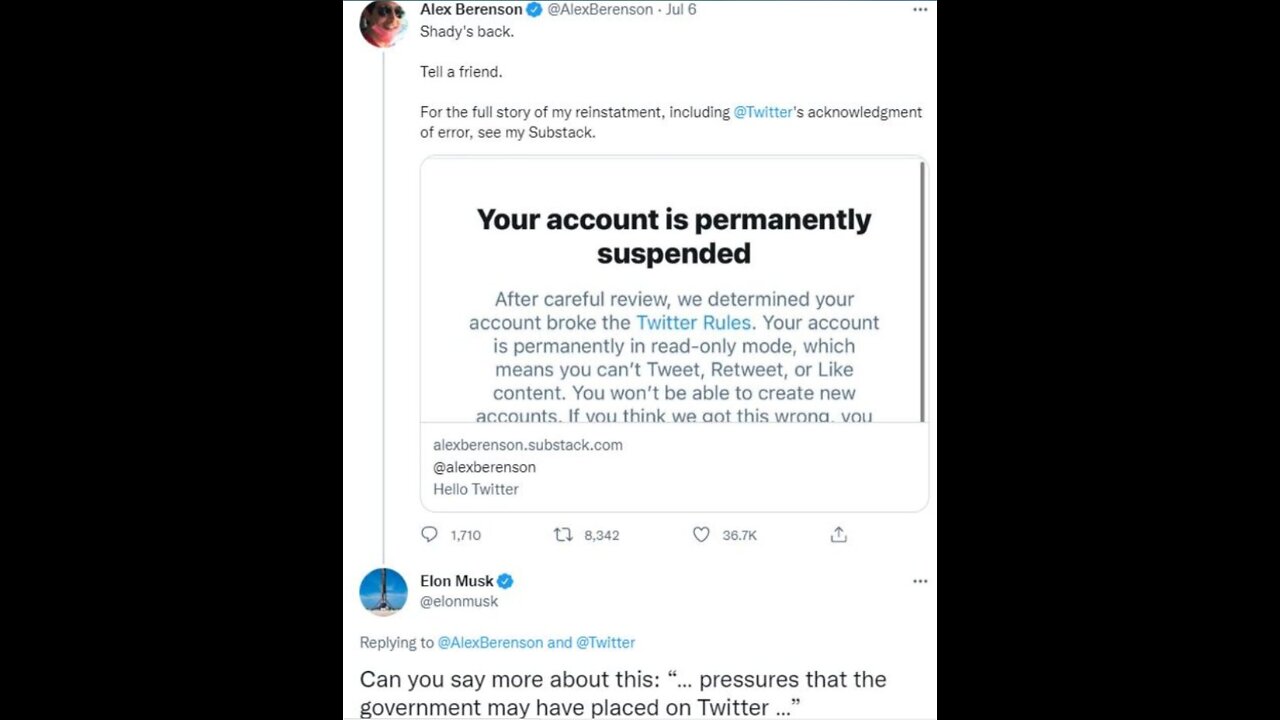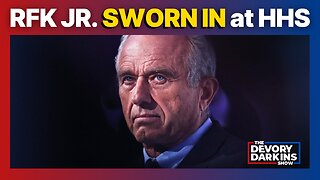Premium Only Content

Feds May Be Involved in Twitter’s Censorship & Elon Musk Is Asking Questions
Red Voice Media Published July 11, 2022
News and Commentary
"...does not end my investigation into the pressures that the government may have placed on Twitter..."
By Gregory Hoyt
July 11, 2022
On the July 6th episode of Timcast IRL, podcast host Tim Pool was joined by political blogger and senior editor of People’s Pundit Daily, Richard Baris, where the topic of whether Twitter is being heavily influenced by the federal government was brought up.
The topic came up after Pool mentioned an exchange between Elon Musk and Alex Berenson on Twitter, where Musk was asking about Berenson’s unexpected return to Twitter after Berenson had been permanently banned from the platform.
On July 6th, Berenson wrote, “Shady’s back. Tell a friend. For the full story of my reinstatement, including [Twitter‘s] acknowledgment of error, see my Substack.”
Musk, clearly having read Berenson’s post on Substack, responded, “Can you say more about this: ‘… pressures that the government may have placed on Twitter …'”
In Berenson’s Substack post that Musk was referring to, he outlined how he’d settled a lawsuit with Twitter pertaining to his permanent suspension that took place back in August of 2021 – and Twitter actually reinstated his account.
However, Berenson couldn’t go into detail about “what it took Twitter to admit it shouldn’t have done what it did,” writing he could tell anyone “because the statement is all I can say about the settlement.”
But there was one portion of the Substack post that has clearly raised eyebrows, so much so that it got Musk’s attention, that being the allusion to the government telling Twitter who to kick off the platform.
“Except I need to add one thing. The settlement does not end my investigation into the pressures that the government may have placed on Twitter to suspend my account. I will have more to say on that issue in the near future.”
It was this tidbit of information that led to Pool speculating that if/when Musk takes the reigns at Twitter that he could find himself wrapped up in some sort of preexisting arrangement with the feds that prohibit him from exposing what’s taking place behind the proverbial curtain.
“Alex Berenson seems to have some kind of information that the government is actively pressuring Twitter to engage in censorship. If Elon Musk takes this company over, it’s going to be really interesting to find out what happens. But how much do you want to bet – say it’s October, Elon Musk – all the news happens. Elon Musk now owns Twitter. And someone immediately says, ‘Okay, Elon, what was going on?’ And he goes, ‘I can’t talk about it.’ How much do you want to bet?”
Pool continued from that point, again referencing Berenson’s case against Twitter that was initially heralded as a First Amendment case in part, which the judge found there to be no grounds for a First Amendment claim because of Section 230 and Twitter being a private company.
“This is what really bugs me about a lot of this is that Alex filed, made a First Amendment claim. And the judge was like, ‘You have no First Amendment claim because it’s private company doing it.’ Not true. We do know there was a story out of California, I think it was Judicial Watch that exposes Democrats were making requests on who they wanted censored.
“These are government actors going to a private company and using them as a cudgel. So we need a court to come in on First Amendment grounds. And we need that information. How do you navigate this when we know they’re doing it? But the courts are like, ‘Well, it’s a private company.’ It’s like yes, how do we get the investigation to show the government is going in and telling them to do these things? How do we get that information?”
In a follow-up Substack post regarding the settlement, Berenson reiterated that he can’t go into specifics regarding the settlement, but did mention that the case could signal a shifting tide in Twitter’s practice of permanently banning accounts seemingly without cause.
Berenson explained that while Section 230 allows for social media companies to ban whatever content they want, and thus can also prohibit specific individuals, the moment they issue platform guidelines then they have to play by the rules they outlined – because it’s a de facto contract.
“Twitter’s position is that it can ban anyone for any reason, fine. Section 230 – at least as it is now interpreted – allows that discretion. But once Twitter or any social media company voluntarily sets and disseminates guidelines that it says it will follow in disciplining or banning users, it must follow those, even if its underlying terms of service explicitly say otherwise.”
-
 1:03:57
1:03:57
Kyle Fortch
2 hours ago $0.70 earnedDJ Chill: DJing For Jelly Roll, SOLD OUT Tour, Performing at Hometown Arena | THE ONE SHEET S1E4
10.2K2 -
![The Deep State Spied On Trump & Sabotaged 2020 Operation To Oust Maduro [EP 4440-8AM]](https://1a-1791.com/video/fwe1/94/s8/1/F/5/k/Z/F5kZx.0kob-small-The-Deep-State-Spied-On-Tru.jpg) 4:05:26
4:05:26
The Pete Santilli Show
13 hours agoThe Deep State Spied On Trump & Sabotaged 2020 Operation To Oust Maduro [EP 4440-8AM]
20.5K2 -
 41:53
41:53
Rethinking the Dollar
1 hour agoHype or Hope? Will THE 50-YEAR FORT KNOX GOLD SCANDAL BE EXPOSED?
5.83K1 -
 1:32:36
1:32:36
Game On!
15 hours ago $8.63 earnedPresident Trump TAKES OVER the Daytona 500!
44.4K12 -
 21:35
21:35
DeVory Darkins
3 days ago $25.28 earnedMitch McConnell TORCHED as Secretary of HHS is sworn in
134K188 -
 1:20:04
1:20:04
Tim Pool
4 days agoGame of Money
183K12 -
 4:48
4:48
Cooking with Gruel
17 hours agoThe Perfect Bacon
24.9K3 -
 11:49
11:49
Reforge Gaming
4 hours agoXbox - Next Game on PlayStation?
17.6K4 -
 27:46
27:46
ArturRehi
1 day agoSurprise Counter-Attack in Kursk Advanced 3 Miles | French Jets Arrive | Ukraine Update
27.7K7 -
 11:51
11:51
Alabama Arsenal
15 hours ago $4.63 earnedThe Silent Sledgehammer | GQ Armory 8.6BLK Paladin
71.4K1